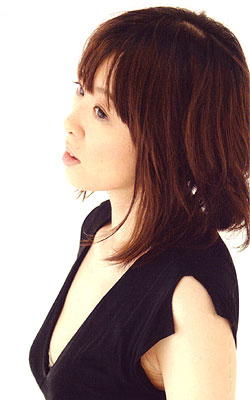
 Name: Shoko Suzuki (鈴木祥子)
Name: Shoko Suzuki (鈴木祥子)
Born: August 21, 1965 in Ōta, Tokyo, Japan
After seriously contemplating a career in music for several years, Shoko's musical career began in earnest in 1985, when she secured a spot as a member of the touring band for Shinji Harada and Crisis, playing keyboards and percussion while adding backing vocals. The next year she performed the same duties in concert as a touring band member for both The Beatniks and Kyoko Koizumi (the latter of whom would later give Shoko her biggest chart success as a songwriter). In 1987 Shoko signed with Epic/Sony records and began making her debut record.
Shoko's debut single, "Natsu wa doko e itta" was released on September 21st, 1988; her debut album, Viridian, followed a month later. The album was produced by Yoshiyuki Sahashi and Akira Nishinira; Sahashi would have a hand in producing every album by Shoko Suzuki up through 1993's RadioGenic, and later produced Atarashii Ai no Uta in 1999.
Like many Japanese recording artists, Shoko kept up a fairly hectic release schedule for many years -- her first five albums were released in a span of just over four years, an unthinkable pace for any comparable Western artist nowadays (though not quite as crazy as, say, The Beatles releasing seven albums in a similar four year time span).
During the recording of the album Hourglass, she began working with producer/musician Hiroaki Sugawara, whom Shoko would marry in 1991 (they entered into the family registry on Christmas Eve). Sugawara played a vital role in Shoko's albums starting with Hourglass, producing, performing on, and occasionally writing songs for Shoko up through Shishousetsu in 1998. The two divorced in 2000.
Shoko's contract with Epic/Sony expired after the release of Candy Apple Red in 1997, after which she signed with Warner Music Japan. Her first album with WEA, Shishousetsu, was highlighted by two songs recorded in collaboration with Tamio Okuda, one of Japan's most well-known rock stars (the two would work together again -- briefly -- on PUFFY's Fever*Fever in 1999).
Shoko's final original album for WEA -- Love, painful love -- remains a landmark as one of the few entirely self-performed albums by a female artist. With the exception of one song written by Yasayuki Okamura, the entire record was written, performed, and produced solely by Shoko.
Upon leaving Warner Music Japan, Shoko became an indies artist and scaled back her recording activities. She released two live albums -- I Was There, I'm Here in 2003 and Love is a sweet harmony in 2005 -- before releasing her next studio album (Suzuki Syoko) in 2006, a span of nearly six years between studio albums.
In preparation of celebrating 20 years since her debut, Shoko signed on with Sony Music Direct and began the process of reissuing her old Epic/Sony material in 2007, which led to the reissues of all her Epic/Sony albums in 2008 and 2009. This period also saw the release of Sweet Serenity, to date Shoko's latest album of original material.
In addition to her own outstanding work, Shoko Suzuki has written songs for many of Japan's most popular recording artists, such as Maaya Sakamoto, Seiko Matsuda, Kyoko Koizumi, PUFFY (aka Puffy AmiYumi) and WINK. She is truly one of the most unique and talented singer-songwriters out there today.
Random Notes
Shoko lived in Houston, Texas for several months in 1979. She learned piano at 13, and drums two years later (around the time she formed her first band). She also won an award for Best Drummer at a contest in 1983.
Some of Shoko's favorite musical artists (past and present): Todd Rundgren, The Beatles, James Taylor, Laura Nyro, Joni Mitchell, Journey, Cheap Trick, KISS, Queen, Sandy Denny and The Bay City Rollers.

